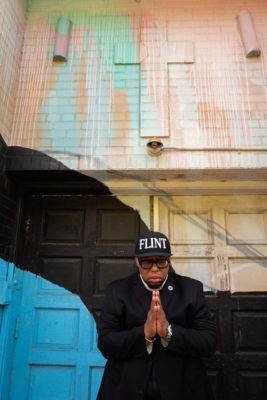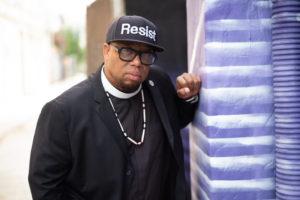Video Courtesy of Hip Hop Caucus
 “As Americans, we face challenges head-on. Climate change is not a Democrat issue or a Republican Issue. It is a human issue. This crisis is complex. It impacts all of us and future generations. And those with the least resources are impacted first and worst,” testified Rev. Lennox Yearwood Jr., president and CEO of the Hip Hop Caucus, before the House Committee on Natural Resources a few weeks ago. “If this committee and both chambers don’t urgently come together, put the people of this country first, put God first and put your political party to the side to solve climate change, we don’t make it beyond 12 years from now without huge amounts of death, destruction, and suffering.”
“As Americans, we face challenges head-on. Climate change is not a Democrat issue or a Republican Issue. It is a human issue. This crisis is complex. It impacts all of us and future generations. And those with the least resources are impacted first and worst,” testified Rev. Lennox Yearwood Jr., president and CEO of the Hip Hop Caucus, before the House Committee on Natural Resources a few weeks ago. “If this committee and both chambers don’t urgently come together, put the people of this country first, put God first and put your political party to the side to solve climate change, we don’t make it beyond 12 years from now without huge amounts of death, destruction, and suffering.”
For more than a decade, Rev. Yearwood and his celebrity-infused, non-partisan Hip Hop Caucus have been hyper-focused on voter turnout, but also tackling big issues, such as climate change and environmental justice, civil and human rights, voting rights and election system reforms, and economic empowerment. The Hip Hop Caucus is the result of four voter drive organizations merging back in 2004: Russell Simmons’ Hip Hop Summit Action Network, P. Diddy’s Citizen Change (“Vote Or Die!”), Jay Z’s “Voice Your Choice,” and AFL-CIO’s “Hip Hop Voices.” It was the force behind the 2008 “Respect My Vote!” campaign, which touted registering the most voters in one day: 32,000 people across 16 U.S. cities.
With the 2020 presidential campaign season kicking in, Urban Faith reached out to Rev. Yearwood to chat about social justice, Christianity, his spiritual journey to fighting for underserved communities, and what’s up next for the Hip Hop Caucus.
Some Christian leaders believe that social justice is not “Christian.” How do you respond to that?
I think there’s nothing more Christian than having social justice. I can’t understand how folks can say they’re Christian and not, to me, see how many times Christ literally fought — fought for the woman by the well, fought for those who were out in the desert who were hungry, fought for those who were infirmed, fought for those who were hurting because there was no fish in the net. I mean, there’s story upon story upon story upon story, even to the very end with the thief on the cross.
I can’t understand how you could not connect social justice and overcoming when people have been wronged, with Christ. So that baffles me a little bit. To me, if your faith is not connected to justice, it doesn’t have the kind of power that it could have with a faith based upon justice and freedom.
You received your bachelor’s degree from the University of the District of Columbia and your Master of Divinity from Howard University. What led you to do what you do? What was your spiritual journey?
I grew up around the church, so the Christian faith was not something that was unusual. I have many ministers in my family. My uncle was a Church of God in Christ bishop. My aunt has her own church. I grew up around a number of faith-driven people who were Christians. My background was one in which I came from a very spiritual background.
I was the student government association president at the University of District Columbia. It wasn’t so much that I was in a situation that I had something that went wrong, so to speak, and was called into ministry. But I believe very strongly in helping people, and I could feel a definite call when I was finishing up my last term. I was also SGA president when I was at divinity school too, but in my second term I began going to homeless ministries here in Washington, DC, and was also very dedicated to working with young people, and a more of social justice type of ministry.
When I went to seminary, my first calling was to go and teach. I was extremely good at the Old Testament and became the first person at Howard Divinity to be a teaching assistant for both the Old Testament and the New Testament because I could speak Greek and Hebrew. I was going to go up and get my Ph.D. in Old Testament studies, which was normal because my parents both had Ph.D.s. My mom has her Ph.D. in psychology, and my dad a Ph.D. in African and social studies — he was a dean at Howard. So it wasn’t a long stretch for me to go that way at all, and to teach.
But it was also a retreat because I was at the time very frustrated with the church. There was a lot of emphasis around prosperity ministry, and that wasn’t for me. I think the calling came when the war was going to break out and we were getting ready to invade Iraq. I was a chaplain, and I began to speak out against the war while I was in the Air Force — I was in the Reserves on the weekends. It wasn’t the best career move.
I got a call from Dr. Ben Chavis, who was working with Russell Simmons, and he says, “Would you like to work with organizing young people?” So, at the time I’m going through a situation with the Air Force. I said, “Well, why not?” Might as well. You know, I didn’t know my journey. I may be thrown in prison. I don’t know what’s going to happen to me because of me speaking out.
It all sounds heroic, but at the time it was very much a situation with my lifestyle of being a middle class, African-American with two very small children. I literally put it on the line for what I believe and trust in God that I was doing the right thing. What I began to see is that I had to give up all of my privilege. My privilege of growing up with parents who had Ph.D.s. My privilege of growing up middle class. My privilege of going to good schools. My privilege of being an SGA president or being on a basketball team. All those things that I would use as privilege had to be stripped away, and I realize that now. They had to be stripped away before I could do effective ministry, so I could be at the bottom. Then, once you get to the bottom and you feel vulnerable, you can connect. Not in charity, but in solidarity with those who have been oppressed. Your whole mission can change and that’s probably where I am now.
I am in a position where I can connect with young people, folks who are from really tough situations, because I’ve been stripped down and can connect with them through faith and Christ.
What are your plans for the 2020 Presidential election? Is the Hip Hop Caucus doing a bus tour again?
 Yeah, yeah. We’re going to get out the vote. Just last year, our “Respect My Vote” campaign celebrated ten years, which is exciting. It was an award-winning campaign. We’re going to continue that. We take a lot of pride in being nonpartisan. When the “Respect My Vote campaign” was created in 2008, I mean, clearly there was a tremendous amount of excitement around Barack Obama, and for a good reason. Nothing wrong with that. But we felt that it was important that young people kept their lane in that. We got a lot of heat back then for not supporting any candidate, and if you were going to support one, that probably would have been the one to support. But we didn’t. We were like no, we want to make sure that we can also hold that person, he or she, accountable, and that’s what we did, and that’s important to us.
Yeah, yeah. We’re going to get out the vote. Just last year, our “Respect My Vote” campaign celebrated ten years, which is exciting. It was an award-winning campaign. We’re going to continue that. We take a lot of pride in being nonpartisan. When the “Respect My Vote campaign” was created in 2008, I mean, clearly there was a tremendous amount of excitement around Barack Obama, and for a good reason. Nothing wrong with that. But we felt that it was important that young people kept their lane in that. We got a lot of heat back then for not supporting any candidate, and if you were going to support one, that probably would have been the one to support. But we didn’t. We were like no, we want to make sure that we can also hold that person, he or she, accountable, and that’s what we did, and that’s important to us.
We want to make sure that whoever is in office, Democratic or Republican or Independent, we’re able to hold you accountable and measurable. Millennials and Gen Z drive us — I mean, we let their issues regarding the economy and climate change and civil rights be at the forefront. Right now, we’re very concerned about what’s going on with the voter suppression and what we saw in North Carolina, Georgia, and Florida. We have issues that affect everybody. It doesn’t matter if you’re Republican or Democratic if you want clean air. I think we all want clean air and we want clean water.
We also challenge ourselves as an organization. We know that in general, our movement and sometimes the culture can be very patriarchal, very male-driven, and so we are actually board-mandated that anything that we do has to have gender balance, or even more so, we have to put forth women in our movement, because it’s such an important thing in that process. We’ve been very blessed doing that for the past 10 years.
